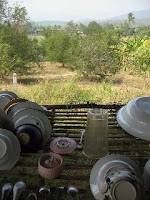
Tourism and Spirituality?
I checked out of the hotel early that morning, saying goodbye to my friend who was still quite ill from food poisoning. She was hoping to go on a 30 day Vispassana retreat once she felt better, something that involved no talking, no music, no writing, and no reading, only sitting meditation. From there she would go with Jan, another visitor to Punpun, and travel to
Feeling rather bad about leaving her in a dire state, yet more than ready to go home, I threw on my pack and walked down the alleyway towards the large street where the huge markets were held. As I walked, I noticed random puddles of fluid and strategically walk around them, as I was certain it hadn’t rained the night before. I had also seen someone walk out into the street and pour their pee onto the pavement. It cost money to use the bathrooms.
It didn’t matter what time of day it was, there always seemed to be massive numbers of people out having breakfast, lunch, or dinner, drinking at a bar. I walked to my favorite little restaurant, AUM - my little haven in the madness. I maneuvered through people walking on the sidewalk, squeezing through to the entrance of the café, and sat down to have some breakfast, feeling at once relaxed.
Sitting down at the table next to me were three middle aged white men. Not the type I would expect to see at a vegetarian restaurant, but this was
The individual seeking spiritual places perhaps inadvertently took part in capitalism – buying a plane ticket to some noted spiritual country, etc. – when the individual may have been able to practice at home without going anywhere. An idea lurked within the minds of many foreigners, it was obvious in their behavior, my own as well, that there was always something better waiting to be had. Reaching enlightenment in my room back home wasn’t nearly as meaningful as reaching it in a temple in some far away land one only read about in books or brochures. Again, the lure of tourism, the push of capitalism.
Where does this spiritual unrest come from? Capitalism in American society has pushed individuals to continually seek the new – new clothes, new electronic gadgets, new adventures in exotic countries, new spirituality. While capitalism only claims to deal with the marketable world, it’s workings have permeated our inner lives. Spirituality has arguably become a marketable commodity, yet the meaning inherent in it is part of the inner life of the person involved in the transaction.
[1] “We have problematized the identity of the native peoples who become the object of the tourist gaze, caught as they are in the paradoxical predicament of encouraging tourism as a route to economic development but realizing at the same time that tourists want to see undeveloped primitive peoples” (Bruner N.D.).


No comments:
Post a Comment